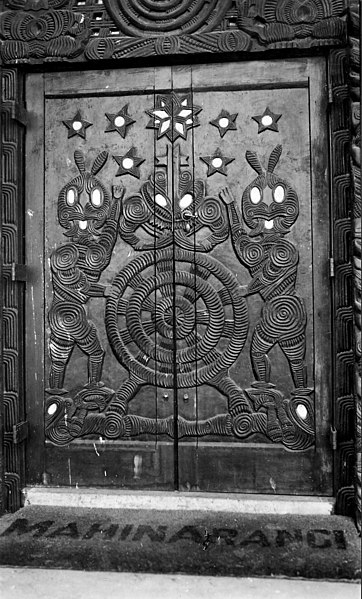In Māori culture, Matariki is the Pleiades star cluster and a celebration of its first rising in late June or early July. The rising marks the beginning of the new year in the Māori lunar calendar.
Matariki
The lone pōhutukawa at Cape Reinga marks Te Rerenga Wairua, the departing place of the spirits of the dead
Door displaying Matariki as part of the Kīngitanga coat of arms, Te Māhinārangi meeting house, Tūrangawaewae marae, Ngāruawāhia
Masthead of Te Paki o Matariki, newspaper of the Kīngitanga movement, showing the stars of Matariki
Māori culture is the customs, cultural practices, and beliefs of the indigenous Māori people of New Zealand. It originated from, and is still part of, Eastern Polynesian culture. Māori culture forms a distinctive part of New Zealand culture and, due to a large diaspora and the incorporation of Māori motifs into popular culture, it is found throughout the world. Within Māoridom, and to a lesser extent throughout New Zealand as a whole, the word Māoritanga is often used as an approximate synonym for Māori culture, the Māori-language suffix -tanga being roughly equivalent to the qualitative noun-ending -ness in English. Māoritanga has also been translated as "[a] Māori way of life." The term kaupapa, meaning the guiding beliefs and principles which act as a base or foundation for behaviour, is also widely used to refer to Māori cultural values.
A wharenui (meeting house) at Ōhinemutu village, Rotorua, with a tekoteko on the top
Early Māori objects similar to Polynesian forms (Wairau Bar, Marlborough), note the volcanic glass from the North Island (top left)
Traditional formal dress of the Classic/contact period, including a dog-skin cloak (kahu kuri), and a mere or patu (short edged weapon).
Traditional formal dress of the Classic/contact period. A hei-tiki around her neck, pounamu earring and shark tooth earring, and two huia feathers in her hair.








